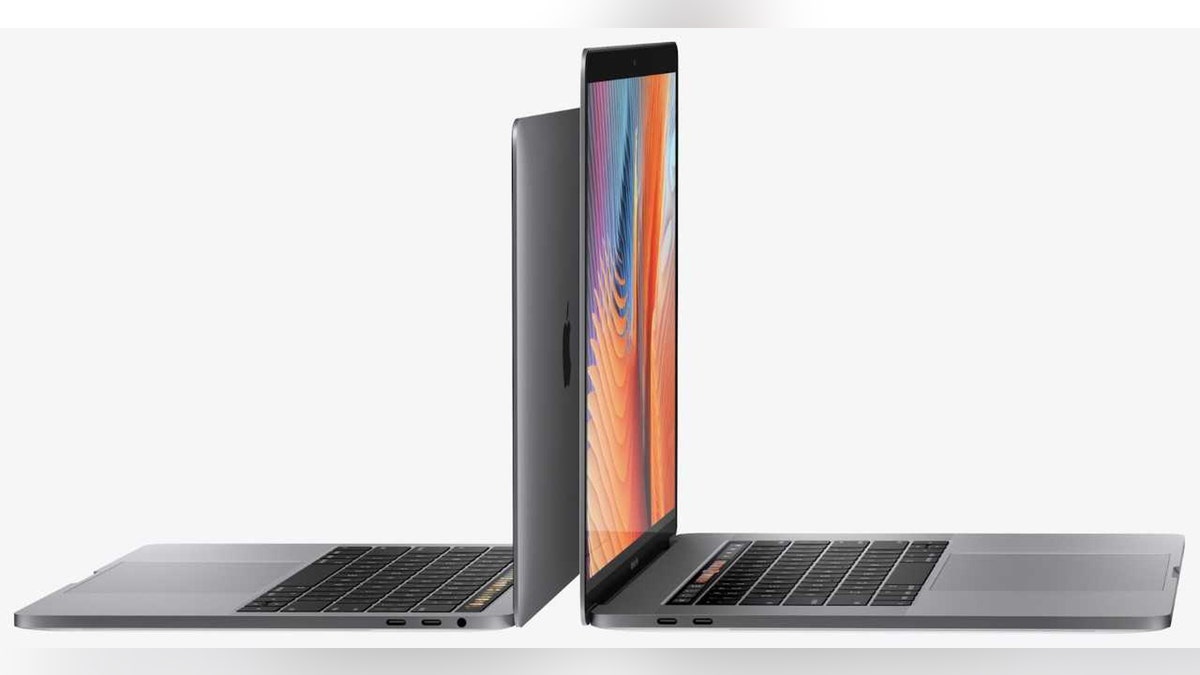
(Credit: Apple)
A software problem is preventing the processors in several models of new Apple MacBook Pros from operating at their full clock speed under some heavy workloads, Apple confirmed on Tuesday. The company is rolling out an operating system update that it says will correct the issue, which affects the 13-inch and 15-inch MacBook Pros unveiled earlier this month.
These new models have more powerful four- or six-core Intel Core i5, Core i7, and Core i9 processors that generate significant heat when they are running at their maximum clock speeds for long periods. The laptops' thermal-management system was programmed incorrectly to deal with this heat, Apple said, which resulted, in some cases, in the new systems lowering clock speeds under heavy thermal loads.
"Following extensive performance testing under numerous workloads, we've identified that there is a missing digital key in the firmware that impacts the thermal management system and could drive clock speeds down under heavy thermal loads on the new MacBook Pro," an Apple spokesperson told PCMag. "We apologize to any customer who has experienced less than optimal performance on their new systems."
Apple said that a software update, macOS High Sierra 10.13.6 Supplemental Update, will be available for download today from the Mac App Store to correct the problem. The company recommends that all owners of the new Touch Bar-equipped 13-inch MacBook Pro and 15-inch MacBook Pro install the update.
More From PCmag
Tuesday's firmware update comes after reports surfaced last week that the top-of-the-line 15-inch MacBook Pro with a Core i9 processor was running, at times, at 2.2GHz under heavy workloads, such as rendering video in Adobe Premiere Pro. The Core i9 in that model is designed to run at a base clock frequency of 2.9GHz, with a 4.9GHz maximum using Intel's Turbo Boost technology.
In a YouTube video posted last week, technology commenter Dave Lee claimed that not only was the Core i9-equipped MacBook Pro running slower than its base clock speed, but that it was also completing video rendering tasks 11 percent slower than the previous-generation MacBook Pro with a Core i7 processor.
Apple replicated the issue by conducting its own testing using a similar but not identical workflow to the one Lee demonstrated, according to sources familiar with the matter. The tests showed throttling not only on the Core i9 laptop, but on all of the models that were announced this month. The base-model 13-inch MacBook Pro without a Touch Bar is not affected, as that machine was not updated in the 2018 refresh.
PCMag has not independently verified the throttling issues that Lee reported on the 15-inch MacBook Pro. However, our 13-inch MacBook Pro sample did experience some graphics-stuttering issues in the course of testing in PC Labs that could be attributed to thermal throttling. We were consulting with Apple on diagnosing these issues when we were given an advance heads-up about the July 24 macOS update.
PCMag's MacBook Pro review unit has not yet received the firmware update, as of publication time. As soon as it receives the update, we will perform our benchmark tests again to determine if there's a performance improvement and update the review and our readers.
Seeking Customers' Trust
It is unclear how such a significant thermal issue escaped Apple's notice before it started selling the new laptops. The company initially claimed that the new 15-inch MacBook Pro is up to 70 percent faster than its predecessor, and the 13-inch MacBook Pro with Touch Bar up to twice as fast. Those claims are still accurate, according to sources familiar with the matter, because these tests were run using test hardware that was not affected by the thermal throttling issue in the initial shipping units.
In addition to facing criticism over CPU throttling, Apple is also dealing with several class-action lawsuits that claim the keyboard switches in earlier models of the MacBook and MacBook Pro are faulty. The company has initiated a free replacement program to fix faulty keyboards on MacBooks and MacBook Pros sold from 2015 to 2017. The 2018 MacBook Pros use a redesigned switch.
Apple is not the only PC manufacturer that has dealt with recalls and thermal throttling issues, but its recent stumbles are particularly noteworthy because this is the first time it has offered the MacBook Pro with a Core i9 processor. That model is aimed at creative professionals such as video editors and photographers whose workloads often require all of a computer's available CPU performance.
A Core i9-equipped MacBook Pro starts at $2,799, and can cost as much $6,699 when a customer orders all of the available options.
This article originally appeared on PCMag.com.
